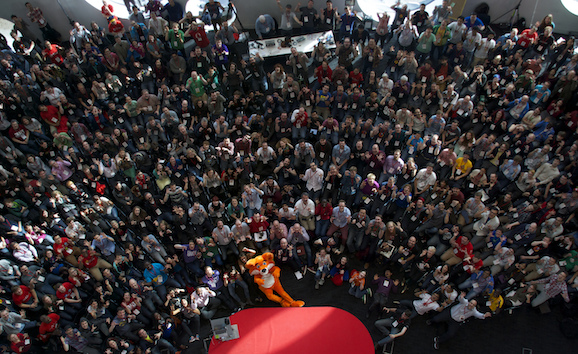Brett Gaylor, Senior Director of Mozilla’s Webmaker project, outlined some of the Webmaker team’s goals for 2014 (originally posted on the Webmaker Team Blog):

Like the rest of Mozilla, 2013 has been a busy year for the Webmaker Product team. In 2014 we’ll build on this year’s work to increase our impact.
A solid foundation
This year was about establishing a solid product base. We did some things that will set us up well for next year, like:
- Establishing a Webmaker Product team in March
- Launching a new iteration of Webmaker.org in June, with user accounts, hosted domains and content galleries, plus a refreshed look and feel for the Webmaker brand
- Switching all of the backend for our creative tools to node.js
- Supporting Mozilla’s global Maker Party with a simple events platform
- Hosting the announcement of the Web Literacy Standard
- Focusing on mentors as our key lead users
Collaboration and Contribution
We learned how to collaborate in new ways this year, most notably:
- We shipped all of our apps in 12 different languages, with another 72 underway. 500 people contributed to this effort.
- We created a tight feedback loop between our users and our development process using surveys, user testing and a weekly cross team call with our colleagues on the Webmaker Community (formerly Mentor) team
2014 – Taking Web Literacy to Market
1) Make web literacy the primary user experience of Webmaker.org
At the Mozilla Festival (#MozFest), we announced the work that Doug Belshaw had been organizing to create a community-based “Web Literacy Standard”. This is a set of skills that the Webmaker community feels defines what it meant to be web literate – capable of both reading (consuming) the web, and writing (making) the web.
We’re really excited about web literacy on the Webmaker Product team because it’s a fantastic differentiator for the work we do at Mozilla. While we’re definitely cousins and supporters of the “learn to code” movement, we know that there is space, and hunger, for a nuanced approach to learning the web that includes designers, media makers, writers, and makers of all stripes. So, we’ve begun to create prototypes for how this set of skills and competencies can create a map for our users to explore. This is quite a User Experience challenge, and we’re looking forward to diving in.
2) Let users share and curate their own channels
We recently unveiled an experimental feature on webmaker.org: user profiles. We wanted to create a lightweight way for people to curate their makes (things people create using Webmaker tools). Gavin Suntop, Front End Architect on the Webmaker team, outlined this feature recently with a Q&A blog.
After receiving feedback from our mentor community, we’ve been thinking of these personally curated profiles as “channels” where users, partners and contributors of all stripes can curate not only things they’ve made on Webmaker, but things they’ve created (or love) from elsewhere on the web. If you haven’t do so already, give your profile a spin and help us improve it by completing the survey.
3) Improve the MakeAPI
Currently, we use our MakeAPI to surface makes on webmaker.org. It unifies our publishing model and lets us do cool things like let people see what they’ve made, see who has remixed their work, and tie their creations to their profile.
Next year we want the MakeAPI to do more. We want other apps besides our own publishing there; we want users to be able to add makes as simple URLs in support of the web literacy work above, and we want others in the open source community to be able to create new apps and use cases on top of our API that we couldn’t imagine.
4) Introduce Appmaker as Webmaker tool
A project we’re incredibly excited about is Appmaker – a creation of the Mozilla Labs team that lets non-developers create mobile apps. It’s a perfect fit for Webmaker’s mission to teach the world the web, and we want it to publish to our MakeAPI and sit side-by-side with Webmaker tools like Popcorn Maker, Thimble and the X-Ray Goggles. Watch the video below to get excited.
5) Move users along an intentional ladder of engagement
If this sounds like marketing speak, don’t worry! All it means is that we want to help everyone become a contributor to Webmaker. If you’ve created a make, we want to help you take the next step and submit makes that help others learn web literacy. Now that we’ve created a foundation with webmaker.org, we can start to get more sophisticated about engaging with our users. Folks who have created events could find others near them, mentors could be invited to our weekly calls, people could meet others who’ve remixed their work etc. We want to have a better conversation with our users so we can encourage everyone to be a producer of the web.
It was a busy, but satisfying year for our team and we’re grateful for the many contributions from our community. We can’t wait to make webmaker.org even more successful in 2014!